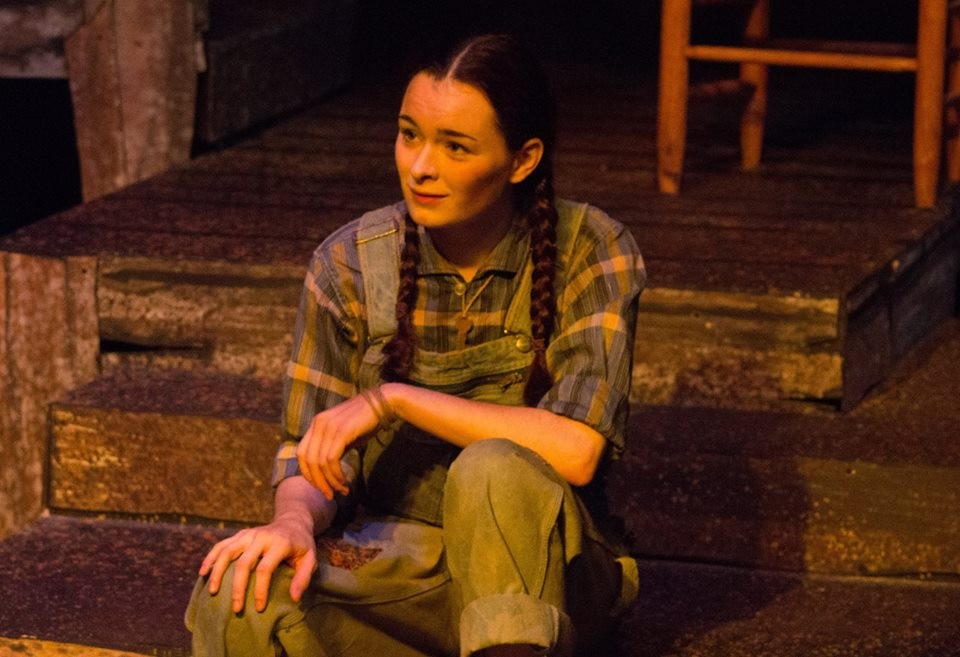
Morgan Howard as Jokate.
If self-consciously Southern material liberally peppered with words like, “reckon,” and “yonder,” make your teeth hurt, then Mountain View isn’t going to be your cup of white lightning bugs. It’s an awfully sweet thing though, bitter about the edges, and lovingly staged by Ken Zimmerman for Playhouse on the Square’s NewWorks@theWorks series. It stars Morgan Howard, who has an uncommon affinity for the play’s central character Jokate, a large-hearted girl growing up hard in mountains full of wonder and hollers full of darkness, with a nagging suspicion she’ll eventually catch a train on down the line. Howard’s been a Playhouse on the Square MVP, and this full throttle performance is the plump, red-cheeked cherry planted on top of an impressive local resume. Sadly, Mountain View is also Howard’s last performance for in Memphis, and her endearing turn as an Appalachian tomboy taking care of her mentally challenged brother, is the best argument for seeing this play new play in its current form. Teri Feigelson’s musically augmented script is packed with lush description, and full of explosive potential. It’s also lopsided— for lack of a better word— with too much telling, not enough showing, many underdeveloped roles and narrative threads that never quite stitch themselves into a quilt.
Mixing simple gesture, with rough hewn detail Terry Twyman’s scenic design sets a proper table for Feigelson’s descriptive feast. The space is vast enough to accommodate a child’s imagination, and intimate enough that Howard isn’t swallowed whole when she’s left alone on stage to monologue. Which is most of the time. Her soaring performance is aided in no small part by a weatherbeaten tree-swing that allows for the illusion of flight. When the avalanche of words isn’t enough to express what’s inside, Howard grabs the rope, leaps onto the swing, and floats around like the memory of an endless Summer vacation.
Just a Swinging: MOUNTAIN VIEW is Americana in a Mason Jar
Zimmerman has peopled Feigelson’s mountain village with an extraordinary cast of a-list actors that serve, primarily as set dressing. Power players like Jim and JoLynn Palmer, Irene Crist, and Michael J. Vails, are all transformed into scenery for Howard to chew.
Mountain View is a storyteller’s showcase. It is also a wistful memory play—a rural answer to The Glass Menagerie with a young, loving, and indefatigable girl standing in for Tennessee Williams’ world weary Tom. Wisely Feigelson’s script leans more heavily on the magic of theatrical convention than tight plotting, or naturalistic performance. It’s an impressionistic work, with wonderful bits of original, folk-inspired music built in. But at this point in development, the supporting characters are props, poorly woven into the fabric of the show.
Just a Swinging: MOUNTAIN VIEW is Americana in a Mason Jar (2)
Jim Palmer stands out as a mean old ginseng-digger who likes a good song, and Alice Berry is a tired wonder as Jokate’s soul-calloused mother. One gets the sense that if Mountain View was contemporary, and not set in some grimly idealized past, there would be more meth in the picture, and fewer teeth in Berry’s head. Additional props go to Isaac Middleton and McCheyne Post who skillfully trade guitar and banjo licks, bringing much-needed authenticity to a play that is honest, but overburdened with artifice.
Mountain View is proof that there can be too much of a good thing. Jokate’s endless monologues are overstuffed with the astute observations of a precocious kid with not much going for her. But within the first five minutes of the show, the audience understands it has been enveloped in an exotic memory, full of birds and bees, and climbing trees. Then at every turn we’re reminded of all the sights, sounds, smells and feels until the descriptions of this world pile up in heaps that outweigh and overpower all the interesting things that happen there. A merciless reduction of verbiage would help, but not as much as figuring out better ways to include the full cast and frame the most important bits of the play’s fractured narrative.